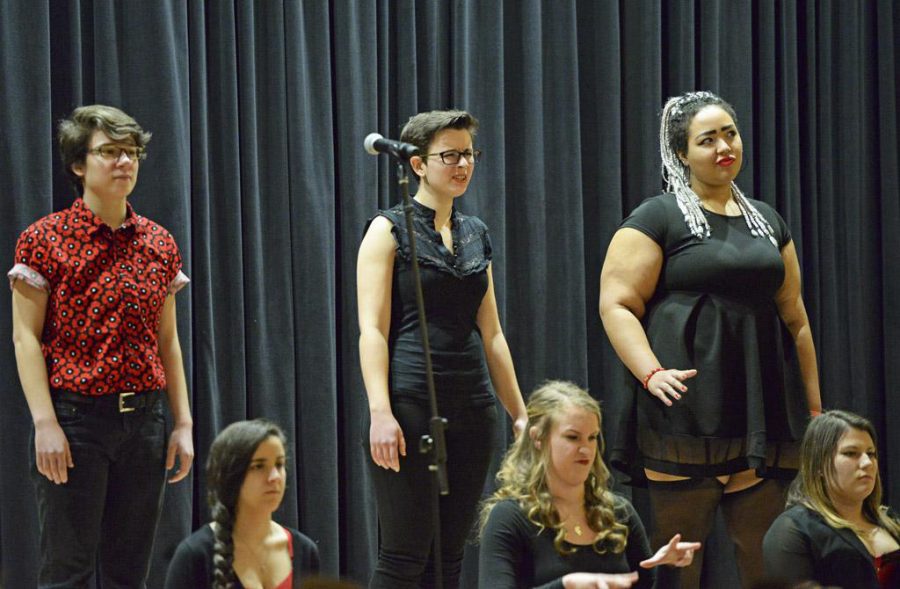I hadn’t heard the word “clitoris” spoken out loud as many times in my entire life as I heard it last Saturday night.
A friend brought me to see the Campus Women’s Organization’s annual production of the Vagina Monologues. As I sat in the darkened ballroom in the William Pitt Union, I watched with surprise as some of my friends and classmates stood on stage and emphatically spoke about experiencing life with a vagina.
But my surprise wasn’t so much because I found the brazen talk of normally taboo material shocking — it was because I didn’t at all.
The actors on the stage performed monologues focusing on everything from tampons to lesbian prostitution — things that I, as someone without a vagina, very infrequently discuss personally. But it seemed to perfectly line up with what I later discovered were the Monologues’ intended purpose: to educate and to allow for a sharing of experiences.
Trisha Klan, a sophomore neuroscience major and one of the actresses in last weekend’s performance, said these two goals are complementary.
“Everyone in the cast bonded over the monologues,” she said. “And as we performed, we could see that we were helping the audience do the same.”
The Vagina Monologues were written by Eve Ensler, based on real interviews with real women and first performed on Broadway in 1996. It has since become a staple annual performance on college campuses around the country.
My first personal memories related to the Monologues were in middle school. My entire pre-collegiate education was in Catholic schools, and so I heard about college performances of the play through an exclusively religious viewpoint. Smatterings of Catholic colleges from Oregon to New York flatly banned its performance, calling it nothing but “vulgarity.”
Catholic higher learning organizations, like the Cardinal Newman Society, railed against what they saw as the glorification of unrestrained sexuality. Patrick Reilly, the Society’s president, told conservative outlet CNS News that banning performance of the Vagina Monologues at Catholic universities was a “defense of their students’ spiritual and mental health.”
In short, the Monologues were thoroughly fixed in my adolescent imagination as a stronghold of shocking depravity — otherwise, the reaction didn’t seem to make sense.
But curiosity overcame me, and the reality of the play came crashing into my imagined version of it as I sat in the audience last Saturday. I was surprised at how uncontroversial and frankly sympathetic the play’s performance was, not just because of my mistaken expectations but because of my sheer wonder at the newness of what I was hearing. I may have never been taught in school what a clitoris was or did, but there I was — listening to a discussion about all 8,000 of its nerve endings. The vast complexity of how people with vaginas experience life — a collection of both social and biological phenomena I’ve never experienced — began to take shape before me as something that, up until then, I had completely ignored.
My unfamiliarity with some of the basic facts of life for women and people with vaginas is far from uncommon. Everyone — regardless of gender or sex — can benefit from greater understanding and empathy for the other.
Klan said several male friends had asked if they should even attend at all, assuming that it was something intended only for women or people with vaginas.
“They’re the ones who should most be seeing the performance,” she said. “It gives an insight into both the good parts of the experience of being a woman and some of the not-so-good parts, too.”
The not-so-good parts can be difficult to discuss frankly and openly, and they often get ignored as a result.
“There are some things where you just feel the need to censor them,” Klan said of the play’s tense monologue dealing with female genital mutilation. “There were things that made me uncomfortable to talk about at first that I ended up realizing shouldn’t. It needs to be said — both for myself and for the people out there who just don’t know about it.”



